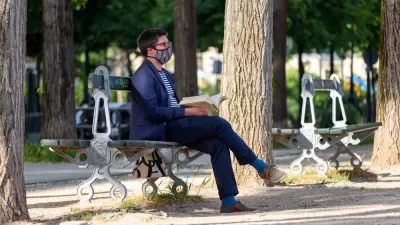If vaccinations are key to ending the pandemic, Israel may get there first as it has the highest rate by far of any nation. Paradoxically, it also has the world's second-highest rate of daily new COVID-19 cases.

"Israel, which has seen several waves of the virus, had raced ahead of other nations and given the first doses of Pfizer’s two-dose vaccine to more than a third of its population [of 9 million] by the end of January," according to the description accompanying The Washington Post's global coronavirus tracker on Feb. 12 (found just below the seventh chart titled, "Case and death counts by country").
Early signs from the country suggest that the large scale of vaccinations have had an impact on the spread of the virus.
“We say with caution, the magic has started,” Eran Segal, a data scientist with the Weizmann Institute of Science in Rehovot, Israel, tweeted on Feb. 1. Segal pointed to declines in new cases, hospitalizations and the number of seriously ill.
According to the tracker's second chart, "Vaccinations by country," Israel leads on Feb. 12 with 41.6% of its population partially vaccinated and 26.5% completely vaccinated, followed by the United Arab Emirates; the African country of Seychelles, an archipelagic island country in the Indian Ocean, and Britain. The United States is fifth, with 11.1% of its population partially vaccinated.
Coronavirus case incidence
Under the fifth chart titled, "Global hot spots for reported cases per capita: – 7-day rolling average of daily new reported cases per 100,000 residents," Israel is second on Feb. 12 with 62 after the Czech Republic with 69.
However, Israel is even more of an anomaly due to the geographic region in which it is located. See the fourth chart, "How the U.S. compares to other regions" located just below the global map for more. The "Middle East and North Africa" average 6 cases per 100k people on Feb. 12, the fifth-highest after:
- U.S.: 31 per 100k
- Europe and Russia: 19 per 100k
- South America: 17 per 100k
- North America, excluding U.S.: 8 per 100k
Three regions average only 1 case per 100k people, meaning the coronavirus has largely been contained: South Asia, "East Asia and Oceania," and Sub-Saharan Africa. [South Africa, where the B1351 variant strain is dominant, is averaging 4 cases per 100k according to The New York Times global tracker on Feb. 12.]
Vaccination success
"Cases of Covid-19 and hospitalizations dropped dramatically among people who were vaccinated within just a few weeks, according to new studies in Israel, where a rapid vaccine rollout has made it a kind of test laboratory for the world," report Jerusalem-based correspondent Isabel Kershner, for The New York Times (source article) on Feb. 5. "And early data suggests that the vaccines are working nearly as well in practice as they did in clinical trials."
The new Israeli study looked at national health statistics for people 60 years and older, who received the Pfizer-BioNTech vaccine first because of their high risk.
“I find this pretty persuasive that we are seeing actual effects of population-level vaccination,” said William Hanage, an epidemiologist at the Harvard T.H. Chan School of Public Health who was not involved with the Israeli study.
On [Jan. 25], the Israeli Health Ministry and Maccabi Health Services, an Israeli health maintenance organization, "released new data on people who had received both doses of the vaccine, showing extremely high rates of effectiveness," reported Kershner earlier.
The ministry found that out of 428,000 Israelis who had received their second doses, a week later only 63, or 0.014 percent, had contracted the virus. Similarly, the Maccabi data showed that more than a week after having received the second dose, only 20 out of roughly 128,600 people, about 0.01 percent, had contracted the virus.
The results are startling in that they exceeded the 95% efficacy found in Pfizer's late-stage vaccine trials.
Israel is "Getting Back to Life"
One major reason for Israel's success stems from the unique agreement that Prime Minister Benjamin Netanyahu reached with Pfizer Chairman and CEO Albert Bourla last month "that will enable all Israelis above age 16 to be inoculated against Covid-19 by the end of March," reported Adam Rasgon for the Times on Jan. 7.
“We are going to be the first country to beat the coronavirus,” Mr. Netanyahu declared in a statement at his office in Jerusalem.
The vow came after days in which health officials warned that Israel’s supply of vaccines was dwindling
As part of the agreement with Pfizer, Mr. Netanyahu said that Israel would be an “international model for quickly vaccinating an entire country” and that Israeli authorities would share data with the pharmaceutical giant to help “develop strategies to defeat” the virus.
On Jan. 7, Israelis who were 60 years and older were eligible for vaccination. On Jan. 19, the age threshold dropped to 40 years and older and the Ministry of Health prepared for administering 250,000 vaccines per day in Operation Getting Back to Life.
Third lockdown
were able to isolate other factors, including lockdowns, which also reduce the number of infections," added Zimmer and Kershner. "The researchers found that even taking those factors into account, the vaccines had a significant impact."
Variants, Ultra-Orthodox Jews, Palestinians
Laurie Kellman reported from Tel Aviv on the limits of vaccines for the Associated Press. The variant B.1.1.7, which originated in the U.K., "now accounts for up to 80 percent of the samples tested in Israel," noted Zimmer and Kershner, which may explain why cases had been rising among the unvaccinated population.
Another factor is what many public health experts refer to as "pandemic fatigue," although rebellion may seem more appropriate, illustrated by the defiance by ultra-Orthodox Jews of public gathering prohibitions and mask-wearing rules.
Kellman exposes the disparity in access to vaccines with the Israeli-occupied West Bank and blockaded Gaza Strip, as does Rasgon for the Times. "That disparity has set off a roiling debate about Israel’s responsibilities as an occupying power in one of the world’s most protracted territorial feuds," reports Rasgon.
"Getting back to life" has made Israel an international model for vaccination, although it has yet to be reflected in the infection data for the country. Dr. Nadav Davidovitch, a member of a government advisory panel, told Kellman that social distancing and masks will be required for the foreseeable future.
“Vaccinations are very important, but they are not going to solve all the problems," he said.
Related in Planetizen:
- Awaiting the Mutant Storm(s), Feb. 4, 2021
- Pandemic Endgame: The Goalposts are Moving, December 30, 2020
- Pandemic Endgame, May 18, 2020
- Israel to Track Coronavirus Using Cellphone Data, March 24, 2020
- Israelis and Palestinians Find Common Ground on Water, December 10, 2013
FULL STORY: Israel’s Vaccination Results Point a Way Out of Virus Pandemic

Planetizen Federal Action Tracker
A weekly monitor of how Trump’s orders and actions are impacting planners and planning in America.

San Francisco's School District Spent $105M To Build Affordable Housing for Teachers — And That's Just the Beginning
SFUSD joins a growing list of school districts using their land holdings to address housing affordability challenges faced by their own employees.

The Tiny, Adorable $7,000 Car Turning Japan Onto EVs
The single seat Mibot charges from a regular plug as quickly as an iPad, and is about half the price of an average EV.

With Protected Lanes, 460% More People Commute by Bike
For those needing more ammo, more data proving what we already knew is here.

In More Metros Than You’d Think, Suburbs are Now More Expensive Than the City
If you're moving to the burbs to save on square footage, data shows you should think again.

The States Losing Rural Delivery Rooms at an Alarming Pace
In some states, as few as 9% of rural hospitals still deliver babies. As a result, rising pre-term births, no adequate pre-term care and "harrowing" close calls are a growing reality.
Urban Design for Planners 1: Software Tools
This six-course series explores essential urban design concepts using open source software and equips planners with the tools they need to participate fully in the urban design process.
Planning for Universal Design
Learn the tools for implementing Universal Design in planning regulations.
Smith Gee Studio
City of Charlotte
City of Camden Redevelopment Agency
City of Astoria
Transportation Research & Education Center (TREC) at Portland State University
US High Speed Rail Association
City of Camden Redevelopment Agency
Municipality of Princeton (NJ)





























